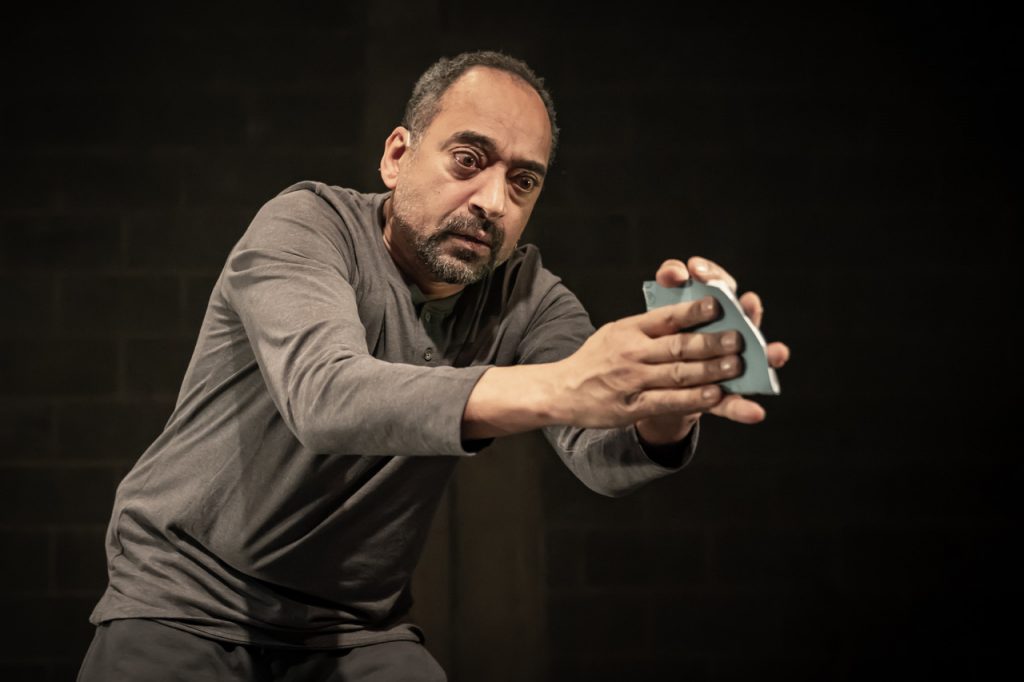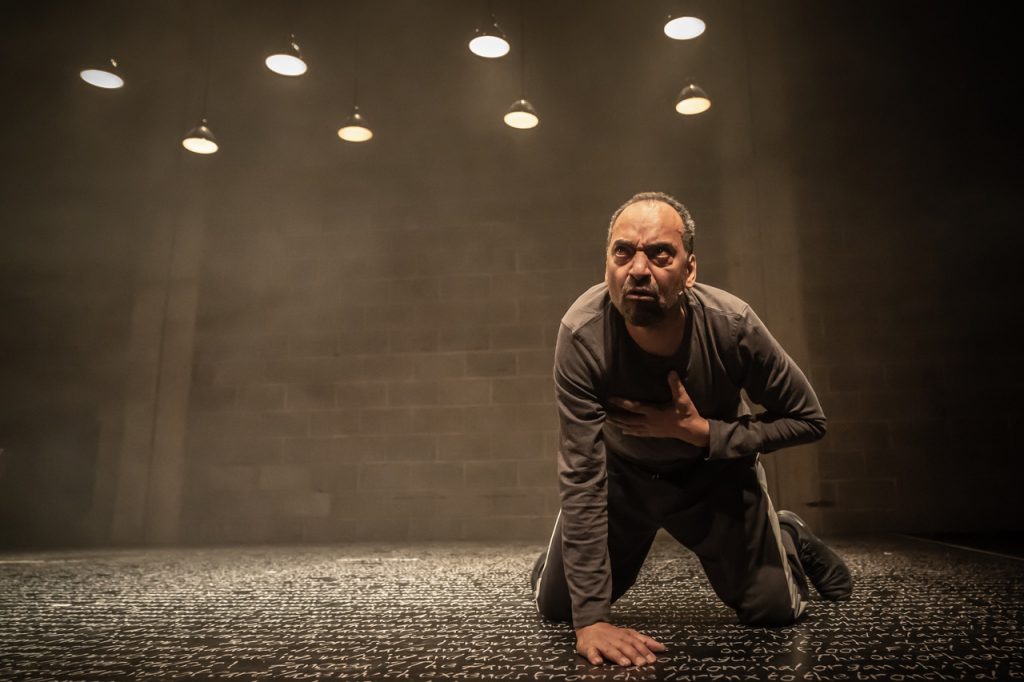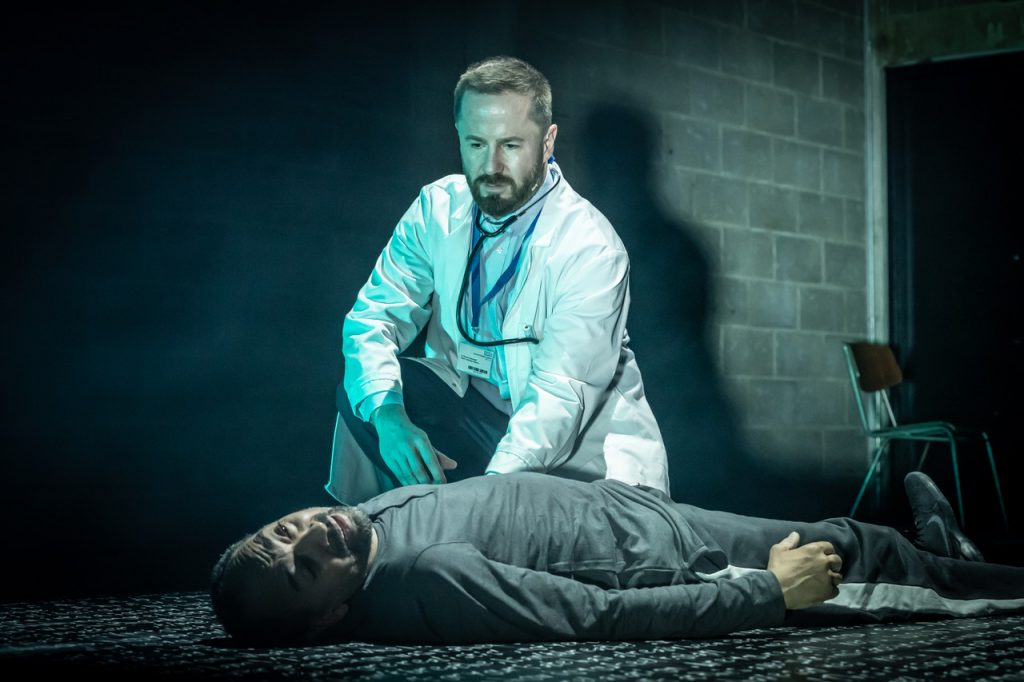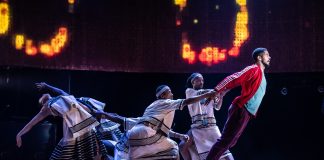You have to work twice as hard to get half as far.
This age-old adage suggests that there is at least some progress for Black people (in the workforce, at school, in general society) despite the inequality they face. And yet, Fidel – who, as a child, is ‘ten times smarter’, a genius, a prodigy etc – doesn’t progress at all in society as he grows up. Instead, Fidel, now a middle-aged man, only has a handful of job rejections (the reason for the rejection always being that he’s ‘overqualified’) and memories of having his intellectualism denigrated. His mind, which was once a filing system of encyclopaedic information, is now a minefield of neuroses arising from this lifetime of racism and discrimination.
Over the course of 75 minutes, we watch Fidel work through his mental illnesses (coded as schizophrenia) and meditate on the root of his childhood trauma at school, where he was constantly ridiculed and overlooked by his white teachers.
The set, designed by Sean Cavanagh, is a bare square stage with a lit outline. This symbolises Fidel’s mind palace, but, as we watch Fidel mentally spiral and physically run around in circles within the square’s confines, we get the impression that this mind palace is more like a prison than anything else. I learnt after that the entire script was written on the floor. Perhaps this is a suggestion of fatalism, how this afflicts Black people no matter how much ‘smarter’ they are. Even a Black person who is 20 times smarter, rather than 10, could still end up like Fidel.
Throughout the play, Fidel writes words that he knows the definitions of on the floor, and mimes writing them on the walls. For such a bare stage and minimum indication of location and character backstory, the actor who plays Fidel, Anthony Ofoegbu, imbues the stage with so much meaning and gravity. Ofoegbu’s physicality is captivating from the moment he steps on the stage. For example, before he mimes writing on the walls, he first mimes regurgitating a pill, and it is such a visceral performance, you forget that not a single thing had been swallowed.
So often, you cannot articulate how you feel, no matter how eloquent or how many words you know. But the sounds you make, the way you breath, the silences you take – the most primitive of human expression – can speak volumes
Ofoegbu brings so much to this performance of a broken but resilient mentally ill man and truly elevates the movement director Shane Shambhu’s physical theatre interludes, which suffer from being repetitive and under-developed. The issue here is that there is a disconnect between the physical theatre and the emotional beats of the story, and so the movement segments don’t drive the story forward. What, for example, does the mime of Fidel chrysalis, an hour into the play, symbolise in the grand scheme of things? I’m not sure, but Ofoegbu acts it out superbly.
Overall, the pacing of the production and the dialogue doesn’t quite keep the audience engaged. This is almost inevitable when it comes to a play about refrains, memories mapped onto other memories, deconstructed and rebuilt, replayed over and over. Writer-come-director Paul Anthony Morris gives us fragments of instances where Fidel was discriminated against as a kid, but he isn’t able to give us any more other than just those fragments. The opportunity was there to utilise the other actor Filip Krenus, who already plays Fidel’s doctor and therapist, to flesh out these origins of traumas. Indeed, his presence halfway through the play helps with the pacing. This moment, when we see Fidel in a psychiatric ward and the lines blurring between reality and his psyche, works so well because Ofoegbu can play off Krenus.
However, Morris uses non-dialogue in an interesting way to showcase mental health. So often, you cannot articulate how you feel, no matter how eloquent or how many words you know. But the sounds you make, the way you breath, the silences you take – the most primitive of human expression – can speak volumes. The decision to mic Ofoegbu means that every sound and noise he makes is picked up, turning it into another character entirely. This sound design, alongside Florian Bel’s composition, is something I would have loved to see explored further in the production.
How does one stage existentialism and the mental effects of racism, beyond asking ‘who am I?’ and saying ‘I know who i am’? The Young Vic associate company, Crying in the Wilderness, never quite gets to the root of this conundrum, despite their valiant attempts.
Company also includes Rachel Summers and Yara Liz.






























